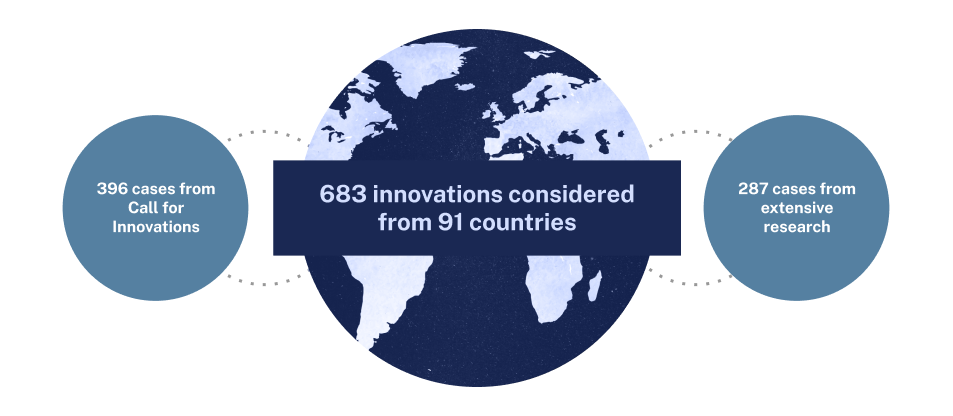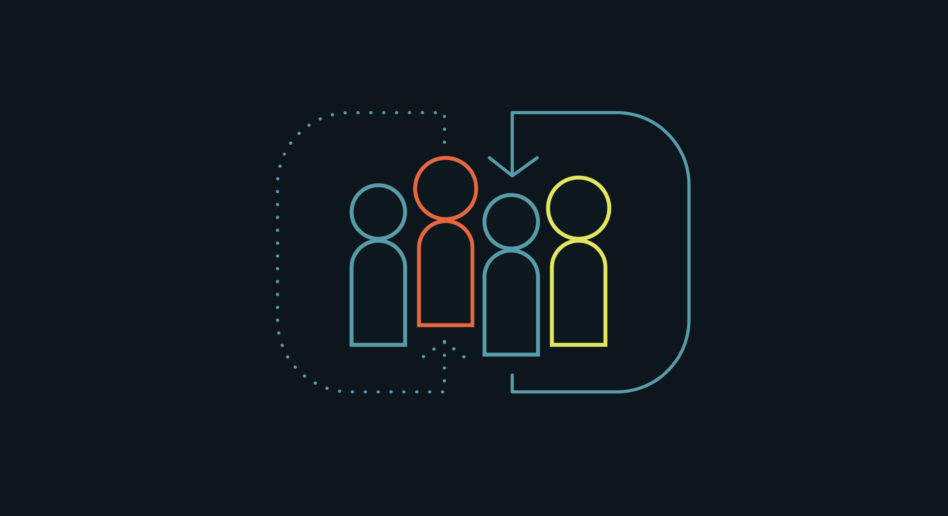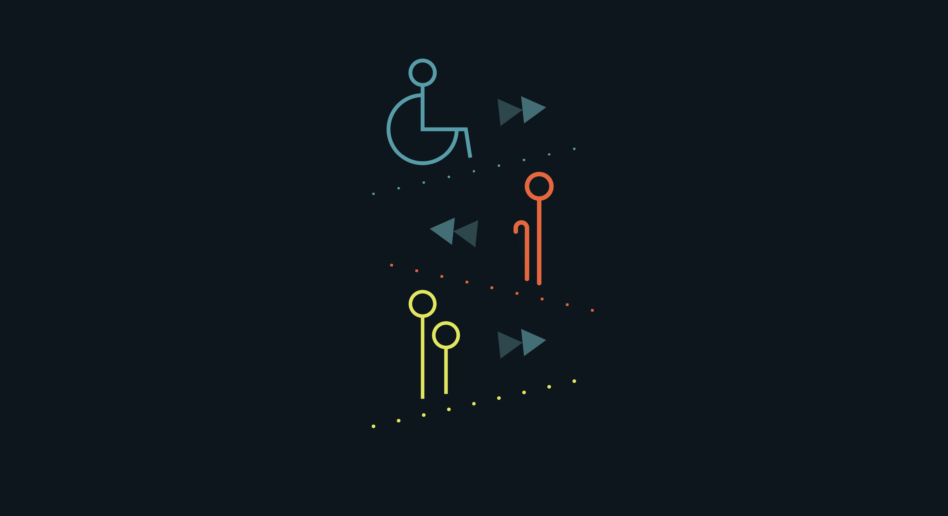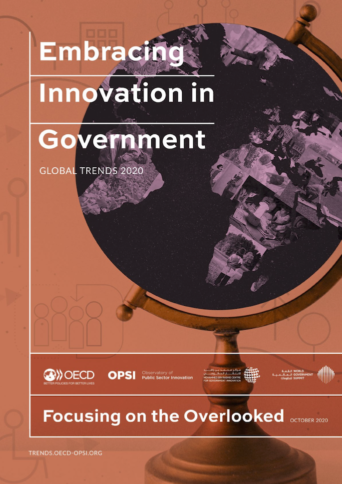Download the Report
Embracing Innovation in Government:
Global Trends 2020
OPSI and the MBRCGI have spent much of the last year working to understand how governments are confronting this challenge. We have conducted extensive research, held a global Call for Innovations crowdsourcing exercise, and met with innovative teams from around the world to surface key trends, examples and stories. Through this work, OPSI and the MBRCGI have found that governments are testing and implementing exciting and innovative new approaches, transforming the ways in which they operate and serve their people.

The third trend in this series finds that governments are focusing on the overlooked by leveraging innovation to broaden their scope of action to specifically address the needs of segments of society that are at risk of falling through the cracks or otherwise need additional support to achieve equitable outcomes. Leading innovative efforts in this area cut across key multi-disciplinary agendas such as the Sustainable Development Goals (SDGs), which emphasise the importance of leaving no one behind and represent a collective responsibility and a shared vision for achieving collective objectives by 2030. The observed innovative efforts match three key themes:
Theme 1: New opportunities for the often neglected
Developing new approaches and creating new beginnings for those who do not fit the typical personas of citizens and residents.
Theme 2: Bridging the urban-rural divide
Recognising the plight and potential of rural communities, which often face major structural challenges, and activating them as agents for innovation.
Theme 3: Accessible and equitable service design
Innovating to counteract challenges and poorer outcomes for those with disabilities by designing services that work for all.

Governments have made significant progress in building up their innovation agendas and implementing creative policies and services. However, some groups of people fall through the cracks of even the most well-intentioned initiatives, either because they do not fit common personas and profiles of citizens and residents, or because they have been intentionally side-lined.
Recent findings show that governments are developing innovative solutions to create new beginnings for migrants, persons experiencing homelessness and those in the criminal justice system, in particular. For migrants, sophisticated analytics and user-centred approaches allows governments to better prepare services and programmes for integration. As with migration, better understanding of homelessness and those at risk allows governments to reduce and in some cases prevent homelessness before it occurs. Finally, new technologies are allowing those in the criminal justice system to maintain better connections with their loved ones and pursue educational opportunities — both linked to lower rates of recidivism.

While 45% of the world’s population live in rural areas, urbanisation trends have starved rural communities of resources and attention in public policy. Innovative governments are recognising both the plight and potential of their rural communities, and are taking action to develop tailored solutions and to activate rural communities as agents for innovation.
Lower population density and longer distances between communities can make infrastructure and service provision costly and more difficult. However, creative approaches can still help ensure equity with urban areas. A key piece of this equity is around providing basic services to rural communities which urban dwellers may take for granted. Better access to electricity, transportation, high-speed internet, and health care were common — and in the case of telemedicine, sometimes interrelated — trends. Beyond specific services, investments in human capital through education and training programmes created additional opportunities for rural residents.

Globally, nearly 1 billion people lack access to electricity and expanding the national electricity grid to cover these hard-to-reach rural communities is expensive and difficult.
To help fill this gap, Barefoot College International—a civil society organisation originating in India —offers training to older women from rural communities in developing countries. Women are selected for a five-month programme to learn how to construct, install and maintain solar home lighting systems. These basic engineering skills help them bring indoor lighting into their own homes, and leverage solar energy to benefit their communities.
Barefoot College has trained over 2 500 women from 93 countries around the world to become solar engineers. These “Solar Mamas” have now electrified over 125 000 households worldwide. At the individual level, the training has resulted in significant personal and professional returns for the Solar Mamas. In their communities, the Solar Mamas’ interventions have had cascading positive effects for education, health, and the local economy.

A significant proportion – 15% of the world’s population – suffer from some form of disability, with over 100 million people experiencing serious functioning difficulties. These physical and mental disabilities prevent large swathes of the population from using the same services or performing the same daily activities as the rest of the population. Designing government services and facilitating a society that allows people to maximise their own potential will enable communities to benefit from the fuller lives lived by those with disabilities.
Orienting innovative services toward those with disabilities and their families allows governments to create more holistic and responsive services to better meet the needs of those they are trying to serve. Additionally, new technologies allow governments to preemptively address barriers to services by better communicating general information in an accessible way and accessibility-specific information more clearly.

Emergency services represent a vital lifeline for citizens. In Georgia, the emergency service number, 112, is the most dialled number nationwide, receiving over 8 million calls per year. However, people who are deaf or hard of hearing face challenges with holding an audio-based conversation over the phone.
To solve this problem, the Government of Georgia’s ServiceLab in conjunction with the United Nations Development Programme (UNDP) organized a series of workshops with emergency services employees and members of the deaf and hard-of-hearing community. The workshops identified video-calling with sign language interpreters as the solution and the groups collaborated to trial the service and subsequently refine it.
The service has almost 100% uptake among members of the union for deaf people, indicating that the vast majority of those with a hearing disability have registered to use this service. With the new service, people who are deaf or hard of hearing now have access to a dedicated service that can respond with precision and speed in emergency situations.
Governments continue to come up with creative and impactful solutions to focus on the overlooked and take care of vulnerable and otherwise disadvantaged people. However, a tremendous amount of work remains to be done to realise the relevant goals and targets that aim to improve the lives of the groups discussed in this report, as well as others in need of equitable policies and services. To help achieve this, governments should:
Additional details on these recommendations, as well as tools and resources for achieving them, are discussed in the full report.
Recent times have produced mixed results in terms of public sector innovation and transformation. While public sector actions have been swift and oftentimes effective, these efforts have not necessarily improved the lives of all citizens, residents and other persons equally or equitably. Rapid and complex technological and societal shifts are improving the lives of many, but leaving others behind, while government efforts to keep up benefit many, but can also exacerbate existing challenges.
Governments and their partners understand that such obstacles to a healthy and prosperous life are unacceptable. Although this report found recent efforts concentrated on certain groups (e.g. migrants, individuals experiencing homelessness, rural dwellers, those with disabilities), many other innovative efforts focus on other relevant areas, such as gender inequality, racial discrimination and mistreatment of indigenous persons, among others. OPSI and the MBRCGI applaud these efforts. More can be done, however, especially in terms of addressing the underlying issues and root causes of these issues – and doing so hand-in-hand with those with lived experience of these challenges.
The world that existed at the start of our research is not the same as the one that exists today. The COVID-19 pandemic has shaken our understanding of the world and the aftershocks will undoubtedly ripple through all domains – personal, economic, social and political. It is clear that 2020 will mark a fundamental shift, posing the question: what changes should be coming out of it? The crisis has re-emphasised the critical role of government and highlighted the necessity of responding quickly, effectively and equitably. This leaves governments in a unique position to answer these questions and determine what the world should look like in 2021 and beyond. They must ensure that their responses do not repeat or exacerbate the mistakes of the past – and that they are inclusive and equitable for all members of society.
